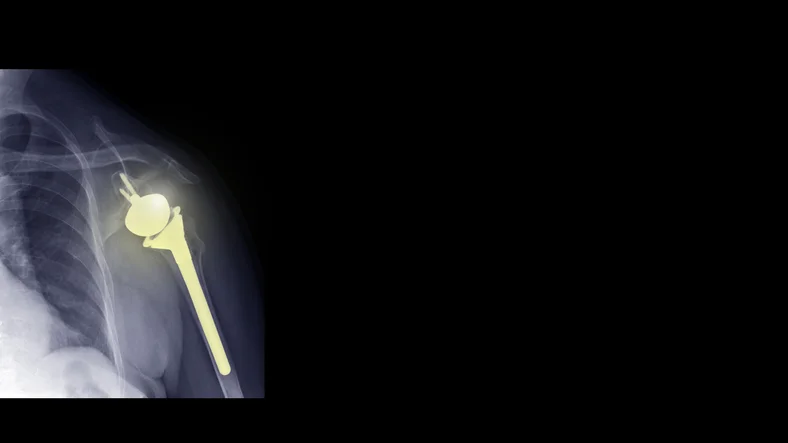You may be entitled to significant compensation, and we can help you understand your legal options. Please click the button below for a Free Consultation or call us toll-free 24 hrs/day for legal advice by dialing (866) 588-0600.
Table Of Contents
- Zimmer Biomet Shoulder Replacement Lawsuit Overview
- Latest Zimmer Biomet Lawsuit Updates
- FDA Reports and Statistics
- Zimmer Biomet Injuries & Side Effects
- Do You Qualify for a Zimmer Biomet Lawsuit?
- Zimmer Biomet Recall Information
- FAQs
- 1. What Evidence is Needed to Support a Zimmer Biomet Shoulder Replacement Lawsuit?
- 2. How Long Does a Zimmer Biomet Shoulder Replacement Lawsuit Take?
- 3. Can I Still File a Lawsuit if I Had the Zimmer Biomet Shoulder Replacement Removed?
- 4. What is the Zimmer Reverse Shoulder Replacement Surgery Device?
- 5. What is the Life Expectancy of a Zimmer Biomet Shoulder Replacement?
- 6. Who Are Comprehensive Reverse Shoulder Humeral Tray Patients?
- Get a Free Biomet Shoulder Replacement Lawsuit Evaluation With Our Lawyers
Zimmer Biomet Shoulder Replacement Lawsuit Overview
Zimmer Biomet initiated the recall after receiving a higher-than-expected number of reports of its Zimmer Biomet Comprehensive Reverse Shoulder System fracturing, which could require revision surgery leading to adverse health complications including permanent loss of shoulder motion, infection, or rarely, death. This is a Class I Food and Drug Administration Recall, which is reserved for Zimmer Biomet Comprehensive Reverse shoulder devices that have a “reasonable probability that use of these products will cause serious adverse health consequences or death.” The recall affected 3,662 shoulder replacement devices distributed from October 2008 to September 2015.
Latest Zimmer Biomet Lawsuit Updates
December 2016 – Zimmer Biomet initiated a Class I FDA recall of the Comprehensive Reverse Shoulder System due to higher-than-expected fracture reports requiring revision surgery [1].
April 2011 – The Custom Comprehensive Reverse Shoulder Humeral Trays (bio-modular base 44mm standard) were recalled because some of the trays may contain a locking ring that was not assembled correctly. The FDA designated this recall as Class II [2].
2010 – The Comprehensive Reverse Shoulder Humeral Tray with Locking Ring (49mm standard) was recalled by Biomet because of complaints that the device was fracturing at the joint. [3] The FDA designated this recall as Class II.
FDA Reports and Statistics
According to a 2023 research by the National Center for Biotechnology and Information, data from 5 registries and 15 studies were included. Rates of implant breakage after shoulder arthroplasty were reported at 0.06–0.86% in registries versus 0.01–6.65% in clinical studies. [4]
The breakage rate per 100,000 observed component years was 10 in clinical studies and 9 in registries. There was a revision rate of 0.09% for registry data and 0.1% for clinical studies within 10 years. The most frequently affected component in connection with implant fracture was the glenoid insert.
Overall, 7.26% of all revision surgeries were due to implant fracture (0.67% of all primary shoulder arthroplasty). The lowest number of fracture rates was found in the Emilia-Romagna Region and RIAP registry in Italy (0.06% in both registries), whereas the highest rates were seen in Norway (0.40%) and Australia (0.88%).
Experimental studies, case reports, and biomechanical studies were excluded because of heterogeneity of examined specimens or population. Registry data and those from clinical studies consider different populations due to different admission criteria. As a result, there is heterogeneity in the included population, which could be the reason for different results – NCBI said.
Zimmer Biomet Injuries & Side Effects
The fracturing of a shoulder replacement device causes the implant to become loose within the shoulder. The fracturing of the device can cause severe pain and discomfort, loss of shoulder function, or even revision surgery.
The law offices of Schmidt & Clark, LLP, are currently accepting potential lawsuits on behalf of patients who suffered the following shoulder replacement injuries:
- Shoulder replacements that have fractured;
- Shoulder replacements that have failed;
- Or shoulder replacements where a revision was required.
Do You Qualify for a Zimmer Biomet Lawsuit?

If you received a reverse shoulder implant between 2008 and 2015, you should contact your doctor and/or surgeon for additional information about the device used. The device you received may qualify for a shoulder replacement lawsuit.
Zimmer Biomet Recall Information
- Product Description: Comprehensive Reverse Shoulder Replacement Device Humeral Tray Model 115340
- Trade Name: Zimmer Biomet Shoulder Replacement Device
- Product Code: KWS, PAO
- Lot Numbers: All lots with part number 115340
- Distribution Dates: October 2008 to September 2015
- Manufacturing Dates: Aug 25, 2008 to Sep 27, 2011
- Shoulder Replacement Devices Recalled: 3662
What is the Zimmer Reverse Shoulder Replacement Surgery Device?
The Zimmer Reverse Shoulder is a shoulder replacement device designed to help restore movement in patients with shoulder tears who have severe arthritis and previously failed shoulder joint replacement.
Although less common than total shoulder replacement, reverse shoulder implant devices are used in thousands of surgeries a year across the U.S.
Clinical studies revealed a similar incidence of implant failure compared to data of worldwide arthroplasty registries. These complications arise mainly due to breakage of screws and glenospheres and there seems to be a direct correlation to loosening – National Center for Biotechnology and Information.
What’s the Problem with the Comprehensive Reverse Shoulder Humeral Tray?
Patients who have undergone shoulder surgery using the Zimmer Biomet Shoulder Humeral Tray are more likely than patients with other implants to require revision surgery. Every surgery in itself poses risks to the patient, who must undergo general anesthesia and work through rehab to recover.
The problem with manufacturer Zimmer Biomet Shoulder is that negligence in design and testing before the product was released and implanted into thousands of patients has caused life-threatening and sometimes life-ending problems.
The FDA approved the Comprehensive Reverse Shoulder Humeral Tray in 2008 through the 510(k) Pre-Market Approval process, which enables products that are substantially similar to products that are already on the market to be released, without a requirement of human clinical trials.
FDA Recommendation
If you underwent shoulder replacement surgery (regardless of whether you received a Zimmer Biomet Comprehensive Reverse Shoulder), you should contact your doctor if you feel anything out of the ordinary.
Additional Information About Device Longevity
In most cases, Zimmer Biomet shoulder replacements fail by simply “wearing out”. The plastic liner on the socket cracks or comes loose over time. Joint replacements are constructed of metal and plastic, mechanical devices that wear out over time just like car parts do.
If you want to prolong the lifespan of your shoulder replacement, you should go easy on it. Most shoulder replacements are not meant for heavy-duty, repetitive lifting. Shoulder replacement patients should not lift more than 40 lbs with the operated arm regularly.
FAQs
1. What Evidence is Needed to Support a Zimmer Biomet Shoulder Replacement Lawsuit?
Medical records, evidence of implant failure, documentation of pain and injuries, and proof of additional surgeries or treatments.
2. How Long Does a Zimmer Biomet Shoulder Replacement Lawsuit Take?
The duration of the Zimmer Biomet shoulder replacement lawsuit varies based on case complexity, but lawsuits can take several months to years to resolve.
3. Can I Still File a Lawsuit if I Had the Zimmer Biomet Shoulder Replacement Removed?
Yes, you can still file a lawsuit even if the Zimmer Biomet shoulder replacement implant has been removed, especially if you suffered injuries or required revision surgery.
4. What is the Zimmer Reverse Shoulder Replacement Surgery Device?
In shoulder blade surgery, a medical device is surgically implanted into the shoulder to repair complex fractures and restore range of motion in a patient who suffers from rotator cuff deficiencies, and/or alleviate pain. The goal of the surgery is to improve arm movement.
5. What is the Life Expectancy of a Zimmer Biomet Shoulder Replacement?
The failure rate for Zimmer Biomet shoulder replacements is about 1% per year. This means that 10% will fail within 10 years, 20% within 20 years, and so on. The failure rate of a Zimmer Biomet shoulder replacement and anatomic shoulder replacement are very similar.
6. Who Are Comprehensive Reverse Shoulder Humeral Tray Patients?
Patients who have received the Zimmer Biomet Comprehensive Reverse Shoulder Humeral Tray are typically those who have lost control of their natural arm movement. Many times, these patients have suffered a rotator cuff tear which is a severe type of shoulder arthritis in different muscles, called cuff tear arthropathy.
Related Articles:
- Zimmer NexGen Knee Replacement Lawsuit
- Zimmer Persona Knee Recall Lawsuit
- Zimmer Hip Replacement Lawsuit
See all related medical device lawsuits our attorneys covered so far.
Get a Free Biomet Shoulder Replacement Lawsuit Evaluation With Our Lawyers
The Medical Device Litigation Group at Schmidt & Clark, LLP law firm is an experienced team of trial lawyers that focus on the representation of plaintiffs in Zimmer Biomet shoulder replacement lawsuits. Our law firm is handling individual litigation nationwide and is currently accepting new injury cases in all 50 states.
Our legal team offers:
- Free, confidential consultations to evaluate your case
- No upfront costs or fees – we handle all case expenses
- Payment only if we win your case through contingency fee arrangements
Free Zimmer Biomet Evaluation: Again, if you have problems with a Zimmer Biomet device, you should contact our law firm immediately. You may be entitled to a settlement by filing a Zimmer Shoulder Replacement Lawsuit and we can help.
References
- https://www.accessdata.fda.gov/scripts/cdrh/cfdocs/cfRes/res.cfm?ID=151859
- https://www.accessdata.fda.gov/scripts/cdrh/cfdocs/cfres/res.cfm?id=99808
- https://www.mddionline.com/orthopedic/high-failure-rate-forces-zimmer-biomet-to-recall-shoulders
- https://www.ncbi.nlm.nih.gov/pmc/articles/PMC10565962/

 Published by
Published by 


